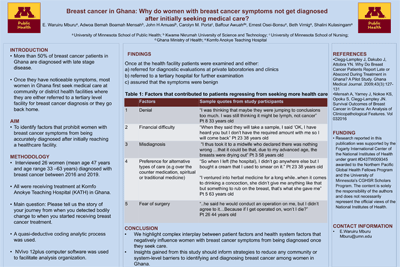Eddah Waruiru Mburu
PhD, Epidemiology
Co-Authors:
Shalini Kulasingam, Beth Virnig, Carolyn M. Porta, John H. Amuasi
Advisor:
Dr. Shalini Kulasingam
Educational Objectives:
To identify factors that prohibit women with breast cancer symptoms from being accurately diagnosed after initially reaching a healthcare facility.
Keywords:
Breast Cancer, Late diagnosis
Abstract
Background: More than 50% of breast cancer patients in Ghana are diagnosed with late stage disease. Ghana does not have a national breast cancer screening program thus most women self-refer to a health facility once they have symptoms. It is critical to identify factors that prevent women with breast cancer symptoms from being diagnosed since delay in diagnosis is associated with lower survival.
Aim: To identify factors that prohibit women with breast cancer symptoms from being accurately diagnosed after initially reaching a healthcare facility.
Methods: We interviewed 26 women (mean age 47, age range 33–63 years) diagnosed with breast cancer between 2016 and 2019. All were receiving treatment at Komfo Anokye Teaching Hospital. A quasi-deductive coding analytic process was used.
Results: Once at the first healthcare facility, patients were examined and either a) referred for diagnostic evaluations at private laboratories; b) referred to a tertiary hospital for further examination; or c) assured that symptoms were benign. Some patients continued onto being diagnosed while others went back home. Factors that contributed to patients regressing from seeking more health care included: denial, financial difficulties, fear of surgery, preference for alternative types of care (e.g traditional medicine and self-medication) and misdiagnosis and misinformation from provider.
Conclusion: This study highlights complex interplay between patient and health system factors that negatively influence women with breast cancer symptoms from being diagnosed once they seek care. Insights gained from this study should inform strategies for improving diagnosis of breast cancer among women in Ghana.
Support
Research reported in this publication was supported by the Fogarty International Center of the National Institutes of Health under grant #D43TW009345 awarded to the Northern Pacific Global Health Fellows Program and the University of Minnesota’s CGHSR Scholars Program. The content is solely the responsibility of the authors and does not necessarily represent the official views of the National Institutes of Health

View Poster (PDF)
